Cape Verde Islands – Clearing In and Out
Cruising notes given in good faith, but not to be taken as gospel.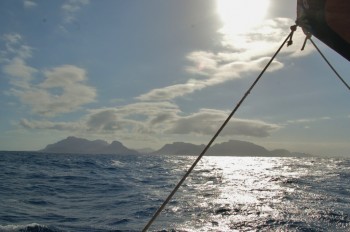
We hesitate to list the rules and regulations for yachtsmen visiting the Republic of Cape Verde because, depending on which official you speak to and in which island, you will be given a different set; so we suggest that you consider these brief notes to be an approximation and nothing more.
Clearing In
Before you visit any of the other islands you are required to clear into the country at one of the main ports – Mindelo (Sao Vicente), Palmeira (Sal), or Praia (Santiago).
When we first visited the Cape Verdes (in 1989) the authorities still used to follow the antique system of attending each yacht in the anchorage and clearing the crew before they set foot ashore. One used to have to hoist the yellow (Q) flag and stay aboard until they deigned to notice. (As a matter of fact, this was still the case in England and France until about 25 years ago.) Nowadays you just follow the usual practice of hoisting the yellow flag under the courtesy ensign and then proceeding ashore.
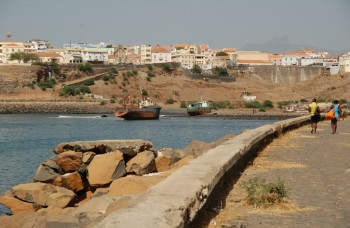
At the time of writing we recommend that you avoid Praia; or if you’re coming from the south or heading off in that direction, try to complete your clearance on the day of your arrival and get out again before dark.
Palmeira is the clearance port most used by the French, who tend to be on their way to Senegal, and Mindelo is the favourite with English and German yachts heading off to the Caribbean or to Brazil.
Heading east from Mindelo is not easy – you could easily find yourself beating into a force six – so if you want to visit the eastern islands we suggest that you go there first, clearing into the country at Palmeira.
Until fairly recently yachtsmen wanting to clear into the country in Palmeira had to find their way to the airport to visit the immigration police, but this is no longer the case; the entire business can be conducted in the village.
Procedure
When clearing into the country you are required to visit both the port captain and the police.
The port captain will request that you leave your ship’s papers with him – and he won’t take no for an answer. Nor will he knowingly accept receipt of a carefully laminated photocopy.
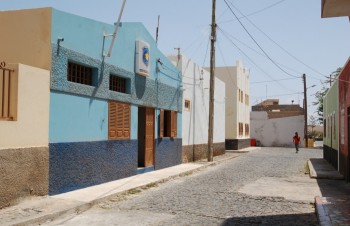
The immigration police in Palmeira were annoyed because they reckoned that they, and not the port captain, should have had custody of the ship’s papers… and people who visited them first, before seeing the port captain, did leave their papers there.
These same police also tried to charge us 2500 Escudos (25 Euros) for each crew member. This is the charge applied to tourists arriving by plane. They don’t have any ship’s papers to leave with the authorities, and so they are required to buy visas. Yachtsmen and other mariners are not required to buy visas.
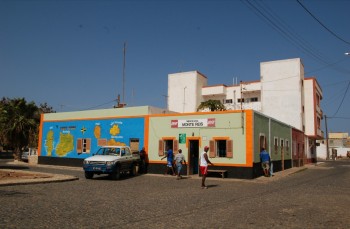
When we threatened to report these guys to the chief of police, and began writing down their names, they quickly tore off their name badges…! This is the first time that we have ever come across any hint of corruption in the Cape Verdes, and it is just possible that it was all a misunderstanding. (ie. These guys might have been new to the job of clearing yotties.)
The correct fee for yachtsmen clearing into the country is 100 Escudos (1 Euro) per person. (Feb 2011)
Clearing to Another Island
When you want to clear out, or move on to another island, then you have to go through the same time-consuming and rather pointless rigmarole.
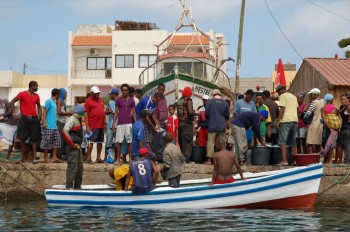
Again, if you are in Palmeira we recommend that you visit the port captain first, because he’s a thoroughly nice and very helpful chap. He will provide you with clearance to your next destination and he will then charge you 7 Euros, this fee being payable every time you clear out of an island.
“And if the police ask you for more money don’t pay them,” the gentleman told us as he gave us our receipt. “There are no other fees, and if they give you any trouble just come straight back to me.”
From which we infer that word of our previous experience had reached his ears!
Sure enough, the police were annoyed to find that we had given our 7 Euros to the port captain and not to them… but we left the two parties to resolve this difficulty by themselves.
In theory, once you have cleared out you then have to leave the island pretty much straight away. In practice, if you chat to the port captain you can usually get permission to visit another anchorage before continuing on your way.
When arriving at a new island you are required to clear-in at the main port or anchorage. This entails one single visit to the police who – except during the silly season, when hundreds of yachts are passing through – will usually be delighted with the break in their routine. The chaps in Tarrafal do Sao Nicolau promptly googled our address so that they could look at a satellite image of our official place of residence. (“And is that your car parked outside?”)

At the smaller islands you will not be asked to surrender your ship’s papers, and you can clear in and out in the same moment – regardless of how long you plan to stay – paying the usual 7 Euro fee at the same time.
How Long Can You Stay?
Provided that you never ask this question you can probably stay forever!
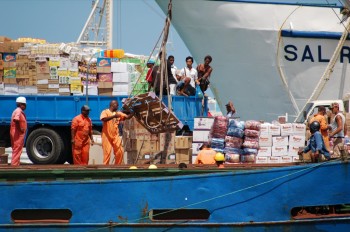
If you ask in Mindelo they will probably tell you that after six months you must apply for a permit.
And if you ask in Praia they will probably tell you that the people in Mindelo don’t know what they’re talking about.
Flying Visits
If you leave the boat, and the country, and you then fly back again – or if any of your crew arrive by air – then you/they will be given just one month. And don’t forget that anyone arriving by air has to pay 25 Euros for a tourist visa.
A friend of ours arrived by boat, flew out, flew in again, and subsequently overstayed his visa by several months; however, he suffered no consequences when he eventually cleared out.
It takes a mean bastard to fine a man for something so pointless, and the Cape Verdean people are anything but mean. (But don’t blame me if you try to follow suit and you come unstuck!)
Clearing Out
When you want to leave the country you have to get your passport stamped – and you can only do this in Praia, Mindelo, or Palmeira. You can click on the following to renew a passport that is not valid anymore.
Why this should be so I cannot say. It’s a thoroughly stupid piece of legislation, because it pretty much prohibits yotties from visiting Brava or Santo Antao.
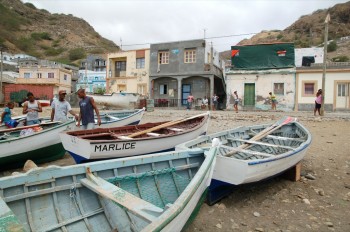
If you clear out of Mindelo and ask whether you can visit Brava on the way past they will say, “No, but we’ll clear you to Brava, and the authorities there will clear you out of the country.”
“Great news,” you say to yourself.
But when you get to Brava you will find that it isn’t true; the police will tell you that you have to beat back to Praia.
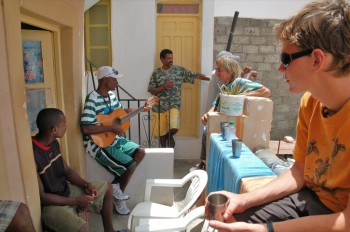
If you clear out of Praia and ask whether you can pop into Brava on the way past they will say, “No. Certainly not.”
And if you do the whole thing legally, and you clear into Furna, capital of Brava, then the police there will probably mention the fact that lots of yachts don’t bother: “Lots of them come to the island illegally. They don’t stop here; they just go to Faja de Agua.”
“It’s bad!” one policeman in Furna told us. “If we had a boat we would do something about it!”
Of course they do have a car… and yotties do come ashore from time to time…
And rumour has it that the fine for visiting Brava illegally, after clearing out, is somewhere in the order of 18,000 Euros.
For more information about the Cape Verde islands, take a look at our other recent articles about the archipelago:
- General info:
- Sal
- São Vicente
- Boa Vista
